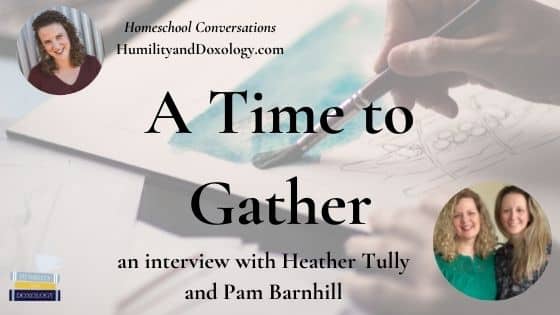Happy February, friends! I just finished typing up a new month of Morning Time and memory work plans for my own homeschool family. It’s one of my favorite things to do as a homeschool mom! As is my custom, I’m sharing what my kids and I are doing here in this blog post. The printable pdf is available on the subscriber freebies page. (Not yet an email subscriber? You get access to all sorts of fabulous freebies plus a weekly poem via email. Sign up at the link below.)

{This post contains paid links. Please see disclaimer.}
Not included on the list is our daily viewing of WORLD Watch News. Click here to get a free month trial.
As always, I typed up the Bible memory verses in our preferred responsive reading format. We’ll take turns being the one to read the light print, and everyone else will reply with the dark print. We’ve found this hugely helpful in keeping us focused during our Scripture memory work time!
You can read more here about how to choose the best homeschool memory work, or head to the Year of Memory Work for a year’s worth of free printable poems, speeches, and other beautiful pieces for recitation! These can also be useful for teaching handwriting in your homeschool.
I’d love to hear what your family will be including in Morning Time this month! Let me know in the comments below.
More Free Homeschool Morning Time and Memory Work Plans
- January 2021
- February 2021
- March 2021
- April 2021
- Macbeth printables from August are available exclusively to email subscribers on the subscriber freebie page. Learn more about Shakespeare in our homeschool here.
- September 2021
- October 2021
- January 2022
- February 2022
- March 2022
- April 2022
- May 2022
- Summer 2022 exclusively on the subscriber freebies page
- August 2022
- September 2022
- October 2022
- January 2023
Homeschool Morning Time February 2023
- Prayer
- Vos Story Bible
- Bible Memory
- Catechism
- Read Aloud
- Poems
- Give Me Liberty (one of the historic speeches included in this free homeschool memory work resource)
- My Jesus, I Love Thee
- Prayer
Colossians 2
For I want you to know what a great conflict I have for you and those in Laodicea, and for as many as have not seen my face in the flesh, that their hearts may be encouraged, being knit together in love, and attaining to all riches of the full assurance of understanding, to the knowledge of the mystery of God, both of the Father and of Christ, in whom are hidden all the treasures of wisdom and knowledge.
Now this I say lest anyone should deceive you with persuasive words. For though I am absent in the flesh, yet I am with you in spirit, rejoicing to see your good order and the steadfastness of your faith in Christ.
As you therefore have received Christ Jesus the Lord, so walk in Him, rooted and built up in Him and established in the faith, as you have been taught, abounding in it with thanksgiving.
Beware lest anyone cheat you through philosophy and empty deceit, according to the tradition of men, according to the basic principles of the world, and not according to Christ. For in Him dwells all the fullness of the Godhead bodily; and you are complete in Him, who is the head of all principality and power.
In Him you were also circumcised with the circumcision made without hands, by putting off the body of the sins of the flesh, by the circumcision of Christ, buried with Him in baptism, in which you also were raised with Him through faith in the working of God, who raised Him from the dead. And you, being dead in your trespasses and the uncircumcision of your flesh, He has made alive together with Him, having forgiven you all trespasses,
having wiped out the handwriting of requirements that was against us, which was contrary to us. And He has taken it out of the way, having nailed it to the cross. Having disarmed principalities and powers, He made a public spectacle of them, triumphing over them in it.
So let no one judge you in food or in drink, or regarding a festival or a new moon or sabbaths, which are a shadow of things to come, but the substance is of Christ. Let no one cheat you of your reward, taking delight in false humility and worship of angels, intruding into those things which he has not seen, vainly puffed up by his fleshly mind, and not holding fast to the Head, from whom all the body, nourished and knit together by joints and ligaments, grows with the increase that is from God.
Therefore, if you died with Christ from the basic principles of the world, why, as though living in the world, do you subject yourselves to regulations—“Do not touch, do not taste, do not handle,” which all concern things which perish with the using—according to the commandments and doctrines of men? These things indeed have an appearance of wisdom in self-imposed religion, false humility, and neglect of the body, but are of no value against the indulgence of the flesh.
Westminster Shorter Catechism questions 49-60
Q. 49. Which is the second commandment?
A. The second commandment is, Thou shalt not make unto thee any graven image, or any likeness of anything that is in heaven above, or that is in the earth beneath, or that is in the water under the earth: thou shalt not bow down thyself to them, nor serve them: for I the Lord thy God am a jealous God, visiting the iniquity of the fathers upon the children unto the third and fourth generation of them that hate me; and showing mercy unto thousands of them that love me, and keep my commandments.
Q. 50. What is required in the second commandment?
A. The second commandment requireth the receiving, observing, and keeping pure and entire, all such religious worship and ordinances as God hath appointed in his word.
Q. 51. What is forbidden in the second commandment?
A. The second commandment forbiddeth the worshiping of God by images, or any other way not appointed in his word.
Q. 52. What are the reasons annexed to the second commandment?
A. The reasons annexed to the second commandment are, God’s sovereignty over us, his propriety in us, and the zeal he hath to his own worship.
Q. 53. Which is the third commandment?
A. The third commandment is, Thou shalt not take the name of the Lord thy God in vain: for the Lord will not hold him guiltless that taketh his name in vain.
Q. 54. What is required in the third commandment?
A. The third commandment requireth the holy and reverent use of God’s names, titles, attributes, ordinances, word and works.
Q. 55. What is forbidden in the third commandment?
A. The third commandment forbiddeth all profaning or abusing of anything whereby God maketh himself known.
Q. 56. What is the reason annexed to the third commandment?
A. The reason annexed to the third commandment is that however the breakers of this commandment may escape punishment from men, yet the Lord our God will not suffer them to escape his righteous judgment.
Q. 57. Which is the fourth commandment?
A. The fourth commandment is, Remember the sabbath day, to keep it holy. Six days shalt thou labor, and do all thy work: but the seventh day is the sabbath of the Lord thy God: in it thou shalt not do any work, thou, nor thy son, nor thy daughter, thy manservant, nor thy maidservant, nor thy cattle, nor thy stranger that is within thy gates: for in six days the Lord made heaven and earth, the sea, and all that in them is, and rested the seventh day: wherefore the Lord blessed the sabbath day, and hallowed it.
Q. 58. What is required in the fourth commandment?
A. The fourth commandment requireth the keeping holy to God such set times as he hath appointed in his word; expressly one whole day in seven, to be a holy sabbath to himself.
Q. 59. Which day of the seven hath God appointed to be the weekly sabbath?
A. From the beginning of the world to the resurrection of Christ, God appointed the seventh day of the week to be the weekly sabbath; and the first day of the week ever since, to continue to the end of the world, which is the Christian sabbath.
Q. 60. How is the sabbath to be sanctified?
A. The sabbath is to be sanctified by a holy resting all that day, even from such worldly employments and recreations as are lawful on other days; and spending the whole time in the public and private exercises of God’s worship, except so much as is to be taken up in the works of necessity and mercy.
Jabberwocky
Lewis Carroll
’Twas brillig, and the slithy toves
Did gyre and gimble in the wabe:
All mimsy were the borogoves,
And the mome raths outgrabe.
“Beware the Jabberwock, my son!
The jaws that bite, the claws that catch!
Beware the Jubjub bird, and shun
The frumious Bandersnatch!”
He took his vorpal sword in hand;
Long time the manxome foe he sought—
So rested he by the Tumtum tree
And stood awhile in thought.
And, as in uffish thought he stood,
The Jabberwock, with eyes of flame,
Came whiffling through the tulgey wood,
And burbled as it came!
One, two! One, two! And through and through
The vorpal blade went snicker-snack!
He left it dead, and with its head
He went galumphing back.
“And hast thou slain the Jabberwock?
Come to my arms, my beamish boy!
O frabjous day! Callooh! Callay!”
He chortled in his joy.
’Twas brillig, and the slithy toves
Did gyre and gimble in the wabe:
All mimsy were the borogoves,
And the mome raths outgrabe.
Discipline
George Herbert
Throw away thy rod,
Throw away thy wrath:
O my God,
Take the gentle path.
For my heart’s desire
Unto thine is bent:
I aspire
To a full consent.
Not a word or look
I affect to own,
But by book,
And thy book alone.
Though I fail, I weep:
Though I halt in pace,
Yet I creep
To the throne of grace.
Then let wrath remove;
Love will do the deed:
For with love
Stony hearts will bleed.
Love is swift of foot;
Love’s a man of war,
And can shoot,
And can hit from far.
Who can ’scape his bow?
That which wrought on thee,
Brought thee low,
Needs must work on me.
Throw away thy rod;
Though man frailties hath,
Thou art God:
Throw away thy wrath.
“Give Me Liberty or Give Me Death” by Patrick Henry
No man thinks more highly than I do of the patriotism, as well as abilities, of the very worthy gentlemen who have just addressed the House. But different men often see the same subject in different lights; and, therefore, I hope it will not be thought disrespectful to those gentlemen if, entertaining as I do opinions of a character very opposite to theirs, I shall speak forth my sentiments freely and without reserve. This is no time for ceremony. The question before the House is one of awful moment to this country. For my own part, I consider it as nothing less than a question of freedom or slavery; and in proportion to the magnitude of the subject ought to be the freedom of the debate. It is only in this way that we can hope to arrive at truth, and fulfill the great responsibility which we hold to God and our country. Should I keep back my opinions at such a time, through fear of giving offense, I should consider myself as guilty of treason towards my country, and of an act of disloyalty toward the Majesty of Heaven, which I revere above all earthly kings.
Mr. President, it is natural to man to indulge in the illusions of hope. We are apt to shut our eyes against a painful truth, and listen to the song of that siren till she transforms us into beasts. Is this the part of wise men, engaged in a great and arduous struggle for liberty? Are we disposed to be of the number of those who, having eyes, see not, and, having ears, hear not, the things which so nearly concern their temporal salvation? For my part, whatever anguish of spirit it may cost, I am willing to know the whole truth; to know the worst, and to provide for it.
I have but one lamp by which my feet are guided, and that is the lamp of experience. I know of no way of judging of the future but by the past. And judging by the past, I wish to know what there has been in the conduct of the British ministry for the last ten years to justify those hopes with which gentlemen have been pleased to solace themselves and the House. Is it that insidious smile with which our petition has been lately received? Trust it not, sir; it will prove a snare to your feet. Suffer not yourselves to be betrayed with a kiss. Ask yourselves how this gracious reception of our petition comports with those warlike preparations which cover our waters and darken our land. Are fleets and armies necessary to a work of love and reconciliation? Have we shown ourselves so unwilling to be reconciled that force must be called in to win back our love? Let us not deceive ourselves, sir. These are the implements of war and subjugation; the last arguments to which kings resort. I ask gentlemen, sir, what means this martial array, if its purpose be not to force us to submission? Can gentlemen assign any other possible motive for it? Has Great Britain any enemy, in this quarter of the world, to call for all this accumulation of navies and armies? No, sir, she has none. They are meant for us: they can be meant for no other. They are sent over to bind and rivet upon us those chains which the British ministry have been so long forging. And what have we to oppose to them? Shall we try argument? Sir, we have been trying that for the last ten years. Have we anything new to offer upon the subject? Nothing. We have held the subject up in every light of which it is capable; but it has been all in vain. Shall we resort to entreaty and humble supplication? What terms shall we find which have not been already exhausted? Let us not, I beseech you, sir, deceive ourselves.
Sir, we have done everything that could be done to avert the storm which is now coming on. We have petitioned; we have remonstrated; we have supplicated; we have prostrated ourselves before the throne, and have implored its interposition to arrest the tyrannical hands of the ministry and Parliament. Our petitions have been slighted; our remonstrances have produced additional violence and insult; our supplications have been disregarded; and we have been spurned, with contempt, from the foot of the throne! In vain, after these things, may we indulge the fond hope of peace and reconciliation. There is no longer any room for hope. If we wish to be free– if we mean to preserve inviolate those inestimable privileges for which we have been so long contending–if we mean not basely to abandon the noble struggle in which we have been so long engaged, and which we have pledged ourselves never to abandon until the glorious object of our contest shall be obtained–we must fight! I repeat it, sir, we must fight! An appeal to arms and to the God of hosts is all that is left us!
They tell us, sir, that we are weak; unable to cope with so formidable an adversary. But when shall we be stronger? Will it be the next week, or the next year? Will it be when we are totally disarmed, and when a British guard shall be stationed in every house? Shall we gather strength by irresolution and inaction? Shall we acquire the means of effectual resistance by lying supinely on our backs and hugging the delusive phantom of hope, until our enemies shall have bound us hand and foot? Sir, we are not weak if we make a proper use of those means which the God of nature hath placed in our power. The millions of people, armed in the holy cause of liberty, and in such a country as that which we possess, are invincible by any force which our enemy can send against us. Besides, sir, we shall not fight our battles alone. There is a just God who presides over the destinies of nations, and who will raise up friends to fight our battles for us. The battle, sir, is not to the strong alone; it is to the vigilant, the active, the brave. Besides, sir, we have no election. If we were base enough to desire it, it is now too late to retire from the contest. There is no retreat but in submission and slavery! Our chains are forged! Their clanking may be heard on the plains of Boston! The war is inevitable–and let it come! I repeat it, sir, let it come.
It is in vain, sir, to extenuate the matter. Gentlemen may cry, Peace, Peace– but there is no peace. The war is actually begun! The next gale that sweeps from the north will bring to our ears the clash of resounding arms! Our brethren are already in the field! Why stand we here idle? What is it that gentlemen wish? What would they have? Is life so dear, or peace so sweet, as to be purchased at the price of chains and slavery? Forbid it, Almighty God! I know not what course others may take; but as for me, give me liberty or give me death!
My Jesus, I Love Thee
- 1 My Jesus, I love thee, I know thou art mine;
for thee all the follies of sin I resign.
My gracious Redeemer, my Savior art thou;
if ever I loved thee, my Jesus, ’tis now. - 2 I love thee because thou hast first loved me,
and purchased my pardon on Calvary’s tree.
I love thee for wearing the thorns on thy brow;
if ever I loved thee, my Jesus, ’tis now. - 3 I’ll love thee in life, I will love thee in death;
and praise thee as long as thou lendest me breath;
and say, when the death-dew lies cold on my brow:
if ever I loved thee, my Jesus, ’tis now. - 4 In mansions of glory and endless delight,
I’ll ever adore thee in heaven so bright;
I’ll sing with the glittering crown on my brow:
if ever I loved thee, my Jesus, ’tis now.






